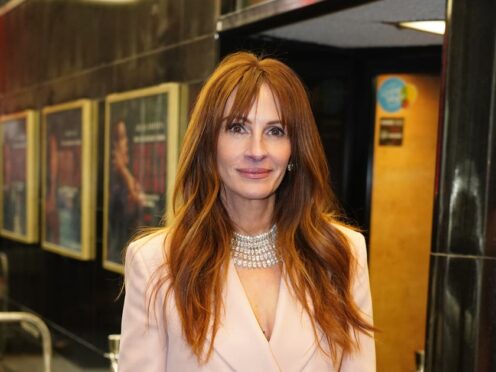Julia Roberts says it “seems more chaotic” now for young people starting out in showbusiness, and added that being famous “just seems exhausting”.
The 56-year-old American actress, and recent star of Netflix film Leave The World Behind, spoke about the film industry and said it is “completely different” now compared to when she was starting out.
Speaking to Notting Hill writer Richard Curtis for the February issue of British Vogue, Roberts said: “It’s (starting out as an actor) completely different from my time.
“I mean, that’s when I really feel like a dinosaur, when you just look at the structure of the business. It’s completely different.”
She added: “I don’t know if it’s better, because it’s not my experience, but it just seems very different. And in a way, it seems so cluttered.
“There are so many elements to being famous now, it just seems exhausting.
“Whereas I feel like, and again this is just my perception, because I don’t really know – I’m not a young person starting out in showbusiness in the 21st century.
“But it seems to me that it was: you meet people, you read for parts, you try to get jobs, you get a job, you try to do a good job, and from that job, you might meet some new people who might suggest you to some other people and then you might get another job and you might get paid a little bit more for that job, and it might be a little bit of a better job.
“It kind of just made this sort of structural sense, and now it just seems more chaotic.
“There’s more elements, there’s more noise, there’s more outlets, there’s more stuff.”
Roberts also spoke on what it has been like to act in the romantic comedy genre, having starred in films like Notting Hill (1999), Pretty Woman (1990) and My Best Friend’s Wedding (1997).
She said: “Well, I love the genre. I mean, my desert island movie would probably be The Philadelphia Story.
“I also think it’s incredibly tricky. I never realised the windfall of good fortune I had until it was well behind me.
“Like, to have made Pretty Woman, Notting Hill and My Best Friend ’s Wedding.
“They just don’t come one after another (normally). So I think I got lucky.”
Roberts has also starred in films including Eat Pray Love (2010), Sleeping With The Enemy (1991) and Mirror Mirror (2012).
She won an Oscar in 2001 for playing the titular role in Erin Brockovich, based on the real life story of a single mother who became an activist for clean water.
See the full feature in the February issue of British Vogue, which is available via digital download and on newsstands from January 16.
